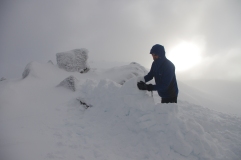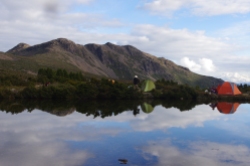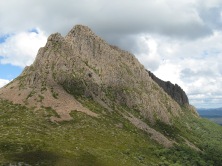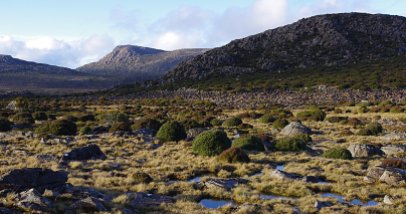How often do you see an image or vista like this when you’re in the mountains? Whether you drive up from the valley towns through mile after mile of grey alpine ash trunks, or wander, ski or ride through the snow gum ghost forests of the high plains, you are witnessing a world that didn’t exist a generation ago.
Whereas we would have infrequent hot fire in the high country in the past, now we have fire on endless repeat. The forests get younger as we get older, yet this new reality of dead trees and thick regrowth becomes understood as being ‘normal’. Many people don’t recognise that what they see as they look out from a ski resort over burnt out hills is actually ecological collapse in real time.
Are we all just witnessing a deteriorating landscape and thinking it is ‘normal’ because we don’t have a memory of what was here before?
As noted in the book Shifting baseline syndrome: causes, consequences, and implications, each new generation accepts the situation in which they were raised as being ‘normal’.
Further,
With ongoing environmental degradation at local, regional, and global scales, people’s accepted thresholds for environmental conditions are continually being lowered. In the absence of past information or experience with historical conditions, members of each new generation accept the situation in which they were raised as being normal. This psychological and sociological phenomenon is termed shifting baseline syndrome (SBS), which is increasingly recognized as one of the fundamental obstacles to addressing a wide range of today’s global environmental issues.
The term was coined by Daniel Pauly in 1995, while speaking of increasing tolerance to fish stock declines over generations, SBS also has roots in psychology, where it is referred to as ‘environmental generational amnesia’. Simply put, Shifting Baseline Syndrome is ‘a gradual change in the accepted norms for the condition of the natural environment due to a lack of experience, memory and/or knowledge of its past condition’. In this sense, what we consider to be a healthy environment now, past generations would consider to be degraded, and what we judge to be degraded now, the next generation will consider to be healthy or ‘normal’.
As the forests go …
If you pay attention you start to see it everywhere. Craig Hore, who is Ranger in Charge-Fire and Emergency Operations in the North East District for Parks Victoria can see it:
‘Since the fires of 2002/3, the mountains have been transformed. With ever more frequent fire and drier conditions, he doesn’t feel that we can go back to what the Alps used to be like. In his early days as a Ranger he could drive through older forests for hours. But now so much of the park has been badly impacted by fires. “I doubt we will ever see those old forests again.” (More here).

We know what we need to do – keep fires out of these forests as they recover. But that will only happen when enough people raise their voice and demand that the state provides the resources to ensure there is enough fire fighting resources to protect these forests even in years like 2019/20. More info here.
… so does the snow
It’s the same with snow. We know that Australian snow pack has been in slow decline since at least 1957. We also know that lower elevation areas and resorts have already been adversely impacted and are increasingly marginal.
There is no doubt that human caused climate change is causing this loss. But there is often a belligerent denialism that is expressed by some within the ski industry and snow community whenever you point this out.
But anyone who is a bit older knows that things have changed in recent decades. From the loss of spring skiing in lutruwita/ Tasmania, to shorter ski seasons, as happened in the winter of 2023, the reality is easy to see.
But younger skiers and riders, who have grown up in a time of climate change, often think that erratic snow seasons, no snow on opening weekend, and reliance on human made snow is normal.
This makes me sad. Beyond a bit of ranting, and endless campaigning, I feel like there is not much I can do to shift this mind set. We can’t change the past. But we can educate ourselves about what came before, and work now to create the conditions that will see our grand kids inherit a world of old trees and deep winter snow.
Remember, action is always the antidote to despair.

ABOVE: survivor trees. Gillios track, Alpine national park.
























































October 20, 2023 at 11:49 am
Thank you for this article. 80 year lifespans are almost too short to notice some changes. Compounding this, those who do try to remind us how things once were, tend to be our older people and their views don’t really count in our society. The western paradigm is that the future is better than the past and we should look forward rather than backward. And that development and use of natural areas is better than leaving them untouched. Can we stop these values being passed from each generation to their children?
October 22, 2023 at 1:47 pm
Yes Cam, the decline of Alpine forests is a difficult thing to watch, especially in the last 15years. If we get another few wild fires within the next 10 years I doubt they with ever recover, and thats not just our Alps that’s would wide.